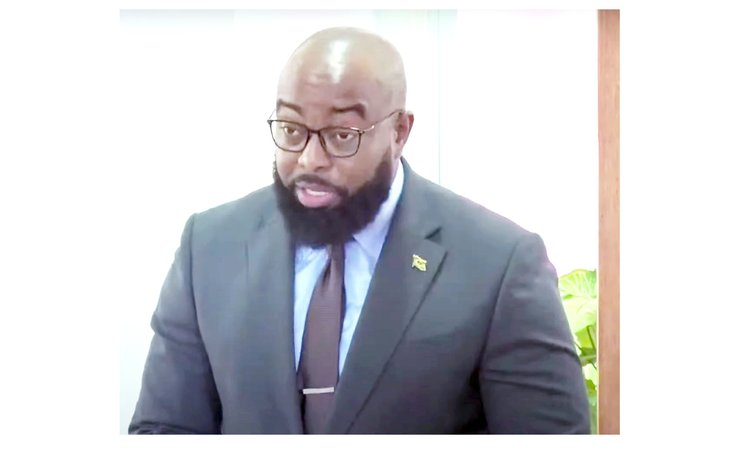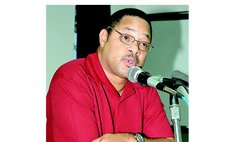Parliament's ten million dollar question

Last week, Dominica's Parliament demonstrated again its complete dominance and absolute control by the ruling Dominica Labour Party. We have made that observation many times before.
On this occasion, it was the refusal of Rayburn Blackmoore, the Security Minister, to answer a question legitimately posed by opposition Senator Delbert Paris.
Senator Paris wanted to know how much the Government of Dominica is paying Trinidad lawyers Israel Khan and associates to prosecute Opposition members for alleged incitement and obstruction.
That case is over five years old and has not moved beyond the Magistrates Court. It will likely die there since one cannot imagine that case being considered by a High Court judge or judges of the Eastern Caribbean Supreme Court (ECSC) or the Caribbean Court of Justice (CCJ).
What is clear is that Khan et al. are reaping a bonanza from Dominica's taxpayers. Last Friday, Edison James, the former Prime Minister, suggested on "Talk on the Block", a talk show on Q95 FM, an opposition-leaning radio station, that the Government was paying the lawyers ten million dollars. That is unconfirmed since James did not say how he arrived at the figure.
Nevertheless, James has a direct and personal interest in the matter because he is among three opposition politicians charged for planning an alleged coup sometime around February 2017 following a significant protest organised by the opposition UWP in response to CBS's 60 Minutes expose of Dominica passport selling programme.
However, it is interesting to note that Joseph Isaac, the current Speaker of the House of Assembly, was also charged along with James and others when Isaac was a member of the UWP. Isaac's charge mysteriously disappeared after he crossed the floor from the UWP to the DLP.
However, we digress.
Blackmoore ducked the question
During the Sixth Meeting of the First Session of the Eleventh Parliament held at the House of Assembly on Friday, November 10, Senator Paris asked Security Minister Blackmoore, in a lengthy question, what the quantum of the bill from Khan's law firm was.
Blackmore responded: "I am going to decline to answer that question in keeping with the rules that govern this honourable House".
He opined that the case was before an independent body, the court.
"I think we have to be careful with that," Speaker Isaac concurred with Minister Blackmoore after saying that it "was a difficult call" to allow the question to be included on the Order Paper of the Parliament because he "did not want to appear to be obstructing the question".
"We do not want to set a precedent," the Speaker said. "We do not want to start opening a can of worms."
Speaker Isaac then advised Senator Paris to refer his question to that almost useless -nobody-respects Public Accounts Committee of the House of Assembly. In managing that question, Speaker Isaac tries to give the impression that he is unbiased. But we know that this is a mirage. Isaac is as biased as the late Alix Boyd Knights, the Speaker he replaced.
The Speaker's role in a real democracy
In parliamentary democracies like Dominica, the Speaker is expected to ensure the orderly and effective functioning of the Legislative arm of Government. Legal luminary Sir Brian Alleyne underscored that expectation some years ago in a speech in which he said the Speaker is the "servant" of Parliament, not its master. The Speaker, he added, is bound by the rules and conventions governing the conduct of the proceedings of the House. He is not the servant of the Executive and, indeed, is bound to jealously preserve the House's and its members' privileges against any incursion by the Executive. Sir Brian concluded that impartiality and neutrality are essential characteristics of the office of Speaker.
However, we argue that the neutrality of the Speaker is a myth, an ideal not supported by practice. There is a fundamental contradiction between what is expected from Speakers of the House of Assembly in the Westminster system of Government that we inherited from Britain and what exists in practice in Dominica today and in the past.
Parliament is brazenly undemocratic. The Prime Minister is an unacknowledged king or dictator who controls, with an iron fist, not only his Cabinet but also Parliament and its agenda. Parliament is no more than an unadorned rubber stamp of the Executive branch of Government, especially in the present environment where the Skerrit-led Government has a vast majority.
The late Attorney-at-Lawyer and historian Dr. William Riviere made that point briefly in an article entitled "Our Constitution: Democracy or One-man Rule", published in the Sun Newspaper in 2014.
"More correctly, it is the Prime Minister as an individual, not the Cabinet as a collective, which from the standpoint of our Constitution dominates the Legislature. The power and authority of the Prime Minister goes beyond this. It is all-pervasive," Dr. Riviere argued.
He added: "The Constitution invests the Prime Minister with power, directly and indirectly, to effectively control not only the Legislature but, as well, the Head of State, the Cabinet of Ministers and the institutions of Public Administration, including the Security Forces. And the Prime Minister is equipped with the power to greatly influence the functioning of the Judiciary".
'Question time' during the sitting of Parliament is one of the few instances in which the Opposition has an opportunity to make government ministers pay attention to the people's business. More importantly, it is an opportunity for citizens to assess whether their Government is acting responsibly and in the people's best interest. The Speaker must ensure that that aspect of Dominica's parliamentary democracy does not become a mockery.
In the interest of transparency and the public's right to know, Minister Blackmoore should have answered Senator Paris's question.




